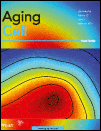Geroprotectors are compounds that slow the biological aging process in model organisms and may therefore extend healthy lifespan in humans. It is hypothesized that they do so by preserving the more youthful function of multiple organ systems. However, this hypothesis has rarely been tested in any organisms besides C. elegans and D. melanogaster. To determine if two life-extending compounds for Drosophila maintain a more youthful phenotype in old mice, we asked if they had anti-aging effects in both the brain and kidney. We utilized rapidly aging senescence-accelerated SAMP8 mice to investigate age-associated protein level alterations in these organs. The test compounds were two cognition-enhancing Alzheimer’s disease drug candidates, J147 and CMS121. Mice were fed the compounds in the last quadrant of their lifespan, when they have cognitive deficits and are beginning to develop CKD. Both compounds improved physiological markers for brain and kidney function. However, these two organs had distinct, tissue-specific protein level alterations that occurred with age, but in both cases, drug treatments restored a more youthful level. These data show that geroprotective AD drug candidates J147 and CMS121 prevent age-associated disease in both brain and kidney, and that their apparent mode of action in each tissue is distinct.




